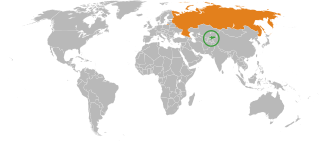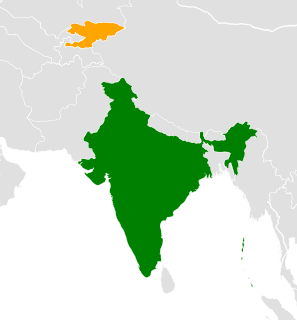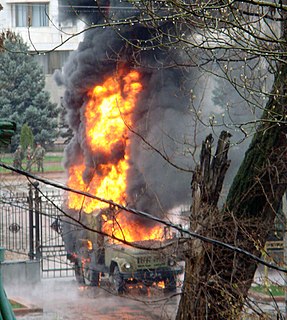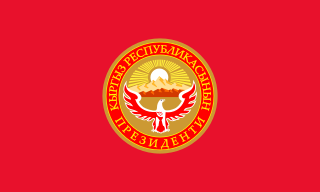
The history of the Kyrgyz people and the land now called Kyrgyzstan goes back more than 2,000 years. Although geographically isolated by its mountainous location, it had an important role as part of the historical Silk Road trade route. In between periods of self-government it was ruled by Göktürks, the Uyghur Empire, and the Khitan people, before being conquered by the Mongols in the 13th century; subsequently it regained independence but was invaded by Kalmyks, Manchus and Uzbeks. In 1876 it became part of the Russian Empire, remaining in the USSR as the Kirghiz Soviet Socialist Republic after the Russian Revolution. Following Mikhael Gorbachev's democratic reforms in the USSR, in 1990 pro-independence candidate Askar Akayev was elected president of the SSR. On 31 August 1991, Kyrgyzstan declared independence from Moscow, and a democratic government was subsequently established.

Kyrgyzstan favors close relations with other members of the Commonwealth of Independent States, particularly Kazakhstan and Russia.
The Kyrgyz Republic national football team is the national team of Kyrgyzstan and is controlled by the Football Federation of the Kyrgyz Republic. It is a member of the Central Asian Football Association, which is a member of the Asian Football Confederation.

The "National Anthem of the Kyrgyz Republic" is the title of the current national anthem of Kyrgyzstan, adopted on 18 December 1992 by a resolution of the Supreme Council of Kyrgyzstan. The music was composed by Nasır Davlesov and Qalıy Moldobasanov, and the words were written by Jamil Sadıqov and Eşmambet Quluyev.

Roza Isakovna Otunbayeva is a Kyrgyz diplomat and politician who served as the President of Kyrgyzstan from 7 April 2010 until 1 December 2011. She was sworn in on July 3, 2010, after acting as interim leader following the 2010 April revolution which led to the ousting of President Kurmanbek Bakiyev. She previously served as Minister of Foreign Affairs and as head of the parliamentary caucus for the Social Democratic Party of Kyrgyzstan.

Kurmanbek Saliyevich Bakiyev is a politician who served as the second President of Kyrgyzstan, from 2005 to 2010. Large opposition protests in April 2010 led to the takeover of government offices, forcing Bakiyev to flee the country.

The Prime Minister of Kyrgyzstan is the head of government of Kyrgyzstan. Until 2010, the President was in a stronger position than the Prime Minister in Kyrgyzstan, but after the 2010 constitutional referendum, the state transitioned to a parliamentary system, placing greater power in parliament and the cabinet at the expense of the president.

The Supreme Council is the unicameral Parliament of the Kyrgyz Republic. It has 120 seats with members elected for a five-year term by party-list proportional voting.

Almazbek Sharshenovich Atambayev is a Kyrgyz politician who served as the President of Kyrgyzstan from 1 December 2011 to 24 November 2017. He was Prime Minister of Kyrgyzstan from 17 December 2010 to 1 December 2011, and from 29 March 2007 to 28 November 2007. He served as Chairman of the Social Democratic Party of Kyrgyzstan (SDPK) from 30 July 1999 to 23 September 2011.

Kyrgyzstan–Russia relations is the relationship between the two countries, Kyrgyzstan and Russia.

Greece–Kyrgyzstan relations are foreign relations between Greece and Kyrgyzstan. Both countries established diplomatic relations in 1992. Greece is represented in Kyrgyzstan through its embassy in Almaty (Kazakhstan). Kyrgyzstan is represented in Greece through a non resident ambassador based in Bishkek. Kyrgyz consular representation in Greece is made by the Kazakh consulate in Athens. What is now Kyrgyzstan was settled by Scythians and was conquered by Alexander the Great.

India–Kyrgyzstan relations is the relation between India and Kyrgyzstan.

The Kyrgyz Revolution of 2010, also known as the Second Kyrgyz Revolution, the April Events or officially as the People's April Revolution, began in April 2010 with the ousting of Kyrgyz president Kurmanbek Bakiyev in the capital Bishkek. It was followed by increased ethnic tension involving Kyrgyz people and Uzbeks in the south of the country, which escalated in June 2010. The violence ultimately led to the consolidation of a new parliamentary system in Kyrgyzstan.
The Sart Kalmyks are an ethnic group of the Oirats, who live in Issyk Kul Province, Kyrgyzstan. Their population is estimated to be c. 12,000. They are descendants of the Ööled tribes, who moved to the territory of the Russian Empire after the fail of the Dungan revolt, some part inhabited the area during the rule of the Zunghar Khanate. They used to speak in a dialect of the Oirat language, but now completely switched to the Kyrgyz language. As a result of the long co-inhabitance with Kyrgyz people their incorporation into Kyrgyz nation occurred, and now the Kyrgyzs consider them to be one of their tribes. Today majority of them identify themselves as Kyrgyz. They belong to the Muslim faith.
Capital punishment in Kyrgyzstan has been abolished.

Sooronbay Sharipovich Jeenbekov is a Kyrgyz politician, and the President of Kyrgyzstan. He officially took office on 24 November 2017. He was also the Prime Minister of Kyrgyzstan from April 2016 to August 2017.

The First Lady or First Gentleman of Kyrgyzstan is the title attributed to the spouse of the President of Kyrgyzstan. The current First Lady of Kyrgyzstan is Aigul Jeenbekova, wife of President Sooronbay Jeenbekov.
Cannabis in Kyrgyzstan is illegal, but has a long history in the nation, which has been posited as the ancestral homeland of the cannabis plant.















